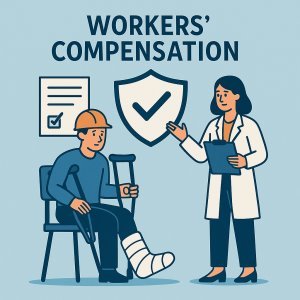
National Workers Comp Carriers: How to Evaluate Your Options
July 23, 2025
Cheap Workers’ Comp? Employee Leasing Firm Guide
July 23, 2025In the bustling world of temporary staffing, where flexibility meets prospect, understanding the intricate landscape of workers’ compensation becomes essential-especially in a state like Georgia. For temp agencies and their workforce alike, navigating the specific requirements of Georgia’s workers’ comp system is not just a legal obligation but a critical step in ensuring protection and peace of mind. This article unpacks the key components and compliance mandates that temp staffing firms must grasp to operate smoothly and safeguard their employees in the Peach State.
Table of contents
- Understanding the Legal Framework Governing Workers’ Compensation in Georgia
- Key Responsibilities of Temp Staffing Agencies Under State Regulations
- Navigating coverage Options for Temporary Employees in georgia
- Best Practices for Compliance and Risk Management in Temp Staffing
- Q&A
- To Conclude
Understanding the legal Framework Governing workers’ Compensation in Georgia

Georgia’s workers’ compensation laws are designed to protect employees while balancing the needs of employers, including those in the temp staffing industry. Under the Georgia Workers’ Compensation Act, most employers, including temp agencies and their clients, must provide coverage for work-related injuries or illnesses. This encompasses temporary staff, who might face unique risks due to varying job assignments and environments. The law mandates that compensation benefits cover medical treatment, wage replacement, and rehabilitation costs, fostering a safety net that supports temp workers without placing undue burden on staffing firms.
For temp staffing companies navigating compliance, understanding the distinction between the temp agency and the client’s responsibilities is crucial. Generally, the staffing agency must secure workers’ compensation insurance for its employees, yet clients who exert control over work conditions may also share liability. Employers in Georgia often benefit from clearly defined contracts outlining coverage obligations to mitigate disputes. Below is a quick overview of key legal aspects in workers’ compensation for temp staffing in Georgia:
- Coverage Requirement: All employers with three or more employees must provide workers’ comp coverage.
- Dual Employers: Both temp agency and client can be liable depending on control and direction.
- Benefit Types: Medical care, temporary total disability, permanent partial disability, and vocational rehabilitation.
| Party | Primary Obligation | Common Challenges |
|---|---|---|
| Temp Staffing Agency | Providing workers’ comp insurance for temps | Managing coverage across multiple clients |
| Client Employer | Ensuring workplace safety & reporting injuries | Clarifying liability in dual employment scenarios |
Key Responsibilities of Temp Staffing Agencies Under State Regulations
Temp staffing agencies operating in Georgia carry notable responsibilities to ensure compliance with the state’s workers’ compensation requirements. These agencies must secure proper coverage to protect temporary employees from occupational injuries, as mandated under Georgia law.It’s essential that these providers maintain clear interaction with client companies regarding coverage obligations, making sure that both agencies and host employers understand who holds liability in case of workplace incidents. moreover, regular monitoring of policy renewals and coverage limits is critical to avoid lapses that could expose temp workers to risks without compensation.
Beyond insurance procurement, temp staffing agencies are charged with educating temporary workers about their rights and the claims process. This includes outlining how injuries should be reported promptly and detailing the support channels available to the injured workers. Agencies should also implement rigorous internal protocols, including:
- Maintaining accurate records of temporary assignments and worker classifications
- Coordinating with insurers for efficient claims processing
- conducting safety training tailored to temporary roles
- Ensuring contractual clarity with clients on workers’ compensation responsibilities
| Agency Responsibility | Key Action |
|---|---|
| Insurance Coverage | Obtain and maintain compliant workers’ comp policies |
| Worker Education | Inform temp workers of their rights and claims process |
| Record-Keeping | Document assignments and classifications thoroughly |
Navigating Coverage Options for Temporary Employees in Georgia
When providing temporary staffing solutions in Georgia, understanding the intricate landscape of workers’ compensation coverage is crucial. Employers often face challenges in determining who-the staffing agency or the host employer-is responsible for securing coverage. Typically, the staffing agency must carry workers’ comp insurance to protect their employees, but clear agreements between both parties are essential to avoid disputes and ensure seamless coverage. without properly defining these responsibilities, temporary workers might be left vulnerable in the event of an injury.
To ease navigation through these complexities, staffing agencies should consider the following key aspects:
- Coverage Verification: Confirm that all temporary employees are covered under a valid policy compliant with Georgia state laws.
- Contractual Clarity: Detailed contracts with host companies outlining workers’ compensation responsibilities and liabilities.
- Regular Updates: Staying informed about changes in Georgia’s workers’ comp regulations to maintain compliance.
- Risk Assessment: Evaluating the nature of temporary job assignments for potential injury risks to adjust coverage levels accordingly.
| Role | Responsibilities | Coverage Type |
|---|---|---|
| Staffing Agency | provide workers’ comp for temps | primary Coverage |
| Host Employer | Maintain safe work surroundings | Secondary Liability |
| Temporary Employee | Report injuries promptly | Covered Party |
Best Practices for Compliance and Risk Management in Temp Staffing
To maintain robust compliance and minimize risks in temp staffing, companies must prioritize clear communication and thorough documentation. Implementing a thorough onboarding process for temporary workers ensures that all parties understand their rights, responsibilities, and safety protocols from day one. using digital tools to track workers’ compensation insurance certificates and review regulatory updates can streamline compliance efforts, keeping staff aligned with current Georgia requirements. Additionally, fostering a culture of proactive risk assessment-like routine workplace inspections and timely incident reporting-strengthens protections for both employees and employers.
Integrating these practices with consistent training and audits helps temp staffing agencies stay ahead in a dynamic regulatory landscape. Consider this simple checklist as a foundation for effective compliance management:
- Verify workers’ compensation coverage for each temp employee
- Conduct regular safety training sessions tailored to job roles
- Maintain up-to-date documentation of incidents and corrective actions
- Partner with reliable insurance carriers specializing in temp staffing
| Compliance Area | Recommended Action | Benefit |
|---|---|---|
| Insurance Verification | Monthly audits of workers’ comp policies | Reduces risk of uncovered claims |
| Incident Reporting | Use digital forms for real-time logging | Accelerates response and resolution |
| Safety Training | Quarterly refreshers specific to industry | Improves worker preparedness and reduces accidents |
Q&A
Q&A: Understanding Georgia Workers’ Comp Requirements for Temp Staffing
Q1: What is workers’ compensation, and why is it vital for temp staffing in Georgia?
A1: Workers’ compensation is a type of insurance that provides medical and wage benefits to employees injured on the job. For temp staffing in Georgia, it’s crucial because it protects both the temporary workers and the staffing agencies from financial risks associated with workplace injuries.Without proper coverage, agencies could face hefty fines or legal action.
Q2: Who is responsible for securing workers’ comp insurance for temporary employees in Georgia?
A2: In Georgia, the responsibility generally falls on the staffing agency. The agency acts as the employer of record for the temp workers and must maintain workers’ compensation insurance for them, ensuring compliance with state laws and protecting their workforce.
Q3: Are there any exceptions to workers’ comp requirements for temporary staffing in Georgia?
A3: Georgia law requires most employers to carry workers’ compensation insurance, but certain small employers with fewer than three employees may be exempt. However, temporary staffing agencies usually exceed this threshold. It’s important to verify specific exemptions and ensure all temps are covered to avoid penalties.
Q4: How dose Georgia define a temporary employee for workers’ comp purposes?
A4: A temporary employee in Georgia is typically someone employed by a staffing agency and assigned to work at another company for a limited period or specific project. Irrespective of their duration, these temps are considered employees of the staffing agency for workers’ compensation coverage.
Q5: What steps should staffing agencies take to stay compliant with Georgia’s workers’ comp laws?
A5: Agencies should first obtain the required workers’ compensation insurance coverage. They must also maintain accurate employee records, report injuries promptly, and educate both their temp workers and client companies about safety and compliance. Regular consultation with legal or insurance experts can help navigate evolving regulations.
Q6: What happens if a temporary staffing agency in Georgia fails to provide workers’ comp coverage?
A6: Failure to provide workers’ compensation insurance can lead to serious consequences including fines, legal liabilities, and potential lawsuits from injured employees. additionally,agencies may lose their right to operate,making compliance not only a legal requirement but also a business necessity.
Q7: Can client companies share the responsibility for workers’ comp coverage of temp workers?
A7: Typically, the staffing agency holds primary responsibility. Though,client companies should confirm the agency’s coverage before bringing temps onsite. Some contracts might outline shared liability or additional insurance requirements, so clear communication and written agreements are essential.
Q8: How does workers’ comp coverage impact temporary workers’ rights and benefits in Georgia?
A8: With workers’ comp coverage, temporary workers are entitled to medical care and wage replacement if injured on the job, similar to permanent employees.This coverage ensures they have financial protection and support during recovery, promoting workplace safety and fairness.
Q9: Are post-injury protocols different for temporary staffing workers?
A9: The process is mostly the same: the employee reports the injury, the agency initiates the claim with the workers’ comp insurer, and the injured worker receives benefits as appropriate. Staffing agencies should coordinate with client employers to facilitate timely care and accurate reporting.
Q10: Where can agencies and temp workers find more information on Georgia’s workers’ compensation laws?
A10: The Georgia State Board of Workers’ Compensation website is a primary resource offering detailed guidance, official forms, and contact information. Additionally, insurance providers and legal counsel specializing in employment law can provide tailored advice for temp staffing compliance.
This Q&A aims to clarify the essential elements of Georgia’s workers’ comp requirements for temporary staffing, helping agencies, client companies, and temporary workers navigate this critical aspect of workplace safety and legal compliance.
To conclude
Navigating the ins and outs of Georgia’s workers’ compensation requirements for temp staffing can feel like decoding a complex puzzle.yet, understanding these regulations is crucial-not just for legal compliance, but for protecting the well-being of every temporary employee who steps onto the job. By staying informed and proactive, staffing agencies and employers can build a safer, more secure work environment that supports temp workers and fosters trust. After all, when everyone knows the rules, temp staffing becomes not just a stopgap solution, but a seamless part of Georgia’s dynamic workforce landscape.
“This content was generated with the assistance of artificial intelligence. While we strive for accuracy, AI-generated content may not always reflect the most current information or professional advice. Users are encouraged to independently verify critical information and, where appropriate, consult with qualified professionals, lawyers, state statutes and regulations & NCCI rules & manuals before making decisions based on this content.”








